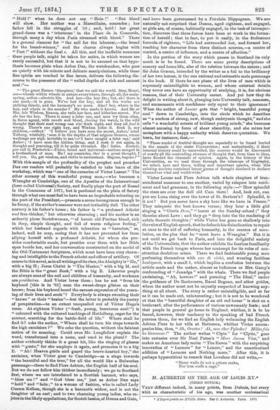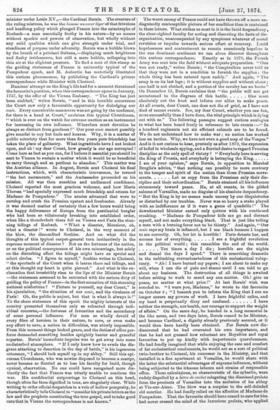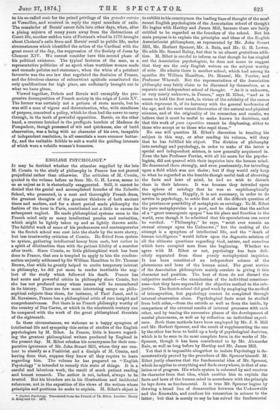M. AUBERTIN ON THE AGE OF LOUIS XV.* (THIRD NOTICE.]
VERY different indeed, in many points, from Dubois, but every whit as characteristic of his age, was another ecclesiastical
• L'Esprit pudic au ITille. Stifle. Par C. Aubertin. Paris. 1573.
minister under Louis XV.,—the Cardinal Bernie. The creature of the ruling mistress, he was the homme au cam- logger of that frivolous and headlong policy which plunged France into the catastrophe of Rosbach—a man essentially frothy in his nature—by no means without sparkle and powers of observation, but wholly without any solid qualities which can give strength under trial, and steadiness of purpose under adversity. Bernie was a bubble blown by the breath of a petulant Sultana,—displaying much brightness and flashy irridescence, but still a mere bubble, collapsing into thin air at the slightest pressure. To find a man of this stamp as the guiding statesman of France is eminently typical of the Pompadour epoch, and M. Aubertin has materially illustrated this curious phenomenon, by publishing the Cardinal's private correspondence while Minister with Choiseul.
Damiens' attempt on the King's life had for a moment threatened the favourite's position, when this correspondence opens in January, 1757, by the offer of the Vienna Embassy. " The King has just been stabbed," writes Bernie, " and in this horrible occurrence the Court saw only a favourable opportunity for dislodging our amie. Every conceivable manoeuvre was set going by the confessor, for there is a band at Court," exclaims this typical Churchman, 4' which is ever on the watch for extreme unction as an instrument for increasing its own influence. Wherefore must devotion be always so distinct from goodness ?" Our poor amie cannot possibly give scandal to any but fools and knaves. Why, it is a matter of public notoriety that for more than five years pure friendship has taken the place of gallantry. What ingratitude have I not looked upon, and oh ! my dear Count, how greatly is our age corrupted ! Come here as fast as you can, for I believe it essential you should be sent to Vienna to sustain a matter which it would be so beneficial to carry through and so perilous to abandon." This matter was the Austrian alliance. In August, Bernie sent Choiseul his final instructions, which, with characteristic irreverence, he termed " the last sacraments," and the Ambassador proceeded on his mission. All was then sunshine and undimmed confidence. Choiseul reported the most gracious welcome, and how Maria Theresa "had specially expressed much friendship and esteem for Madame de Pompadour." The armies advanced that were to envelop and crush the Prussian upstart and freebooter. Already it was deemed matter of certainty that a few hours would bring the happy deliverance of Europe from the pestilential burglar who had been so villainously breaking into established order, when like a thunderbolt there fell on Vienna and Paris the stun- ning tidings of Rosbach. " What a disaster, Monsieur, oh, what a disaster !" wrote to Choiseul, in the very moment of the blow, the discomfited Soubise. And on what did the thoughts of this typical carpet-general turn instinctively in the supreme moment of disaster ? Not on the fortunes of the nation, or on the political consequences of his own miscarriage, but solely on the disturbing effect the tidings might have on special and select circles. " I figure to myself," Soubise writes to Choiseul, " the spectacle of the Court when it learns these sad tidings, and at this thought my heart is quite pierced." And what is the ex- clamation that irresistibly rises to the lips of the Minister Bernie —the statesman assumed to be entrusted with the serious duty of guiding the policy of France—in the first sensation of this stunning national misfortune ? "Picture to yourself, my dear Count," is his ejaculation, " the situation of our amie, and the virulence of Paris ! Oh, the public is unjust, but that is what it always is !" To the sham statesmen of this epoch the mighty interests of the country presented themselves only as refracted through indi- vidual concerns,—the fortunes of favourites and the ascendancy of some personal influence. For men so wholly devoid of every fibre of heroism in their nature, to save, or even make any effort to save, a nation in difficulties, was utterly impossible. From this moment things looked grave, and the duties of office per- force demanded something besides sprightly banter and graceful repartee. Bernie immediate impulse was to get away into some undisturbed atmosphere. " If I only knew how to evade the dis- grace attaching to desertion in the day of battle," is his ingenuous utterance, "I should lock myself up in my abbey." Still this epi- curean Churchman, who was nowise disposed to become a martyr, never became so flurried as to lose his faculty for lucid, though cynical, observation. No one could have recognised more dis- tinctly the fact that France was utterly unable to continue the war. His confidential outpourings to Choiseul on this head, though often far from dignified in tone, are singularly clear. 'While writing to order official despatches in a vein of hollow pomposity, he characteristically tells Choiseul to " consider his private letters as the law and the prophets constituting the true gospel, and to take good care that in Vienna the correspondence is not known."
The worst enemy of France could not have thrown off a more un- disguisedly contemptible picture of her condition than is contained in these letters. What strikes us moat in it is the lucid despondency, the clear-sighted faculty for noting and dissecting the facts of dis- organisation, unaccompanied by any symptoms whatever of moral revulsion or impulse towards serious effort at recovery. Lucid hopelessness and contentment to remain consciously hopeless is the one dominant sentiment we can alone discover throughout this curious correspondence. Exactly as in 1870, the French Army was sent into the field without adequate preparation. " One was not ready," writes Bernis ; " the Comptrollers never told us that they were not in a condition to furnish the supplies ; the whole thing has been entered upon rashly." And again, " The army is on its last legs ; it is without supplies and without shoes ; one-half is not clothed, and a portion of the cavalry has no boots." On December 13, Bernie exclaims that " the public will not get accustomed to the disgrace of this battle One must absolutely cut the knot and inform our allies to make peace. At all events, dear Count, one does not die of grief, as I have not died of recent events. See, my dear Count, whether you can fan, more successfully than I have done, the vital principle which is dying out with us." The following passages suggest curious analogies to what has been heard freely in reference to late events :—" In a hundred regiments not six efficient colonels are to be found. We do not understand how to make war ; no nation has worked less on tactics. Why, we have not even a good map of the Vosges." And is it not curious to hear, precisely as after 1870, the expression of belief in wholesale spying, and a flurried desire to regard Prussian discipline as the only spell of victory ? " Everybody here is serving the King of Prussia, and everybody is betraying the King I am of your opinion," says Bernie, in opposition to Marshal Broglie's advice, " that nothing can possibly be more contrary to the temper and spirit of the nation than these Prussian move-
ments Let us copy from the Prussians only their dis- cipline and their subordination." Bernis strained all his influence strenuously toward peace. He, at all events, in the gilded saloons of Versailles, made no disguise of his absolute despondency. " But the King is by no means made uneasy by our disquietudes or disturbed by our troubles. Never was so heavy a stake played with an indifference as if it were a game of quadrille !" The downhearted Minister earned only quizzes with his continued croaking. " Madame de Pompadour bids me go and distract myself, and not make everything black. That is just like telling a man with a burning fever not to be thirsty." And again, " Our amie says my brain is inflamed, but I see black because I happen to see correctly. Oh, her lot is horrible ! Paris detests her, and
accuses her of everything I see a frightful revolution in the political world ; this resembles the end of the world.
Ten times a day I die ; horrible are the nights and dismal the days I spend." There is something dramatic in the unblushing cravenheartedneas of this ecclesiastical volup- tuary. " Ah ! I have burned my papers ; I am about to make my will, when I can die of pain and shame until I am told to go about my business. The destruction of all things is awaited before setting to work to mend any one matter. Oh ! give us peace, no matter at what price !" At last Bernis' wish was acceded to. "I warn you, Madame," he wrote to tha favourite on October 4 ; " I beseech you to inform the King that I can no longer ensure my powers of work. I have frightful colics, and my head is perpetually dizzy and confused I have neither the strength, nor health, nor courage to support the weight of affairs." On the same day, be handed in a long memorial in the like sense, and two days later, Bernis ceased to be Minister, and became Cardinal, a dignity already previously secured, or it would then have hardly been obtained. For Bemis now dis- discovered that he had overrated his own importance, and that he had not guessed how reluctant are Royalties and royal favourites to put up kindly with importunate querulousness. He had fondly imagined that while enjoying the ease and comfort of fat ecclesiastical emoluments, he would act as a sort of political twin-brother to Choiseul, his successor in the Ministry, and that installed in a fine apartment at Versailles, he would share with the latter the substantial advantages of supreme influence, without being subjected to the irksome labours and strains of responsible office. These calculations, so characteristic of the sybarite, were rudely dispelled by a lettre de cachet relegating the dismissed prelate from the precincts of Versailles into the seclusion of his abbey at Vic-sur-Aisne. The blow was a surprise to the self-deluded old courtier. He had fondly relied on the affection of Madame de Pompadour. That the favourite should have ceased to care for him had never crossed the mind of the luxurious prelate, who applied
to his so-called trade for the prized privilege of the grandes entrées at Versailles, and received in reply the royal mandate of exile. The remainder of Bernie' career falls into other days, when, after a pining sojourn of many years away from the distractions of Court life, another sudden turn of Fortune's wheel in 1770 brought about Choiseul's exile from and Bernie' recall to public life, under circumstances which identified the action of the Cardinal with the great event of the day, the suppression of the Society of Jeans by Clement XIV. We cannot consider here this second phase of his political existence. The typical features of the man, as a representative politician of an epoch when worthless women made and unmade policies and statesmen, when the whim of a petulant favourite was the one law that regulated the destinies of France, and the frivolous charms of subservient aptitude constituted the only qualifications for high place, are sufficiently brought out in what we have given.
Viewed together, Dubois and Bernie well exemplify the pro- gressive decomposition of French society in the reign of Louis XV. The former was certainly not a pattern of stern morals, but he was still a man of vigour and determination, who, with steadiness of purpose, conceived a policy, which he then had the nerve to carry through, in the teeth of powerful opposition. Bernie, on the other hand, a creature hatched in the profligate boudoir of Madame de Pompadour, though possessed of wit and quickness, also of lucid observation, was a being with no character of his own, incapable of independent resolution, in all essentials a mere summer butter- fly, and the veritable fribble to suit a world the guiding interests of which were a volatile woman's humours.




































 Previous page
Previous page